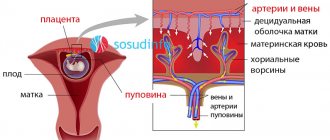What is pregnancy toxicosis
Morning sickness, or early toxicosis of pregnancy, is a condition familiar to almost 70% of women expecting a child.
Nausea, increased salivation, loss or change in appetite, reaction to certain odors and foods are typical symptoms of early toxicosis. The only positive thing about this condition is, perhaps, the fact that it is the first obvious sign of pregnancy. There is still no clear answer to the question of the causes of this condition. Hormones, dietary habits, the presence of chronic diseases, the psychological background of pregnancy, and some neurological aspects of the health of the expectant mother all play a role.
Nausea, the most unpleasant symptom of morning sickness, begins immediately after waking up and goes away as physical activity increases, but can last all day and bother a pregnant woman even at night.
One of the causes of nausea is hCG - human chorionic gonadotropin, the most well-known pregnancy hormone, with the help of which it is determined (using a urine test). It begins to be produced by the body as soon as the fertilized egg attaches to the wall of the uterus. An exact correlation between nausea and this event has not yet been established, but the fact that both processes coincide in time speaks in favor of the assumption that a connection does exist.
According to other theories, the hormone estrogen, stress, a sensitive stomach, fatigue and other factors are to blame for the occurrence of nausea.
Early toxicosis is most active in the first months of pregnancy. It occurs around the 6th week, weakens by the end of the first trimester, and in most cases goes away completely by the 15th – 22nd week. And only a small percentage of expectant mothers will experience this condition throughout their pregnancy.
Not all morning sickness remedies are equally effective. Each pregnancy is unique and depends on the hormonal, neurological, immune, endocrinological, and psychological status of the woman. Nevertheless, we hope that from all the remedies listed below you will be able to choose for yourself something that will bring you relief. How to cope with toxicosis
- In the morning, do not rush to leave the bed immediately. Set your alarm a little earlier than your desired time and, when you wake up, have breakfast in bed. To do this, always keep crackers, cereal, crackers or an apple next to your bed. A light breakfast helps prevent morning sickness.
- Have a good breakfast, preferably choosing foods high in protein, such as cottage cheese or eggs.
- Sugary foods eaten on an empty stomach contribute to nausea.
- Eat small meals several times a day. Progesterone, which supports your pregnancy, slows the movement of food through your digestive tract. Therefore, try not to overeat. Make it a rule to drink a glass of drinking water 30 minutes before meals or 30 minutes after meals (but not during!).
- Give preference to warm, cool and cold foods (sandwiches, salads) and simple dishes (rice, toast, baked potatoes).
- The breaks between meals should not be long - do not make yourself feel hungry: nausea is often what appears as a result of this condition, so you should always have a snack on hand.
- Rest as often and as much as your body requires, especially if you get up early in the morning. However, try to avoid napping immediately after eating: this can only make nausea worse.
- Do not make sudden movements or bends: they provoke vomiting.
- Avoid foods and smells that make you feel nauseous.
- Drink enough fluids throughout the day to avoid dehydration and blood clots.
- Avoid stuffiness and excessive heat: this aggravates attacks of nausea. Ventilate the rooms in your house more often.
- In the evening menu, include non-spicy, unsalted and low-fat dishes without a pronounced aroma.
- Go to bed on time to get enough sleep and recuperate for the next day.
- Spend more time outdoors.
What helps with nausea
Some foods help relieve unpleasant symptoms:
- crackers, croutons;
- raw vegetables and fruits, especially sour ones;
- lemon (drink lemon juice with water, eat a slice, inhale the aroma);
- tangerine, grapefruit (especially cold ones);
- watermelon;
- ginger (herbal tea, jam and ginger gummies);
- mint (in moderation, in the form of tea or candy; according to many pregnant women, mint is the best medicine for nausea, but for some it has the opposite effect);
- jelly;
- fruit ice, sorbet (don't get carried away!);
- lollipops (especially mint, ginger, lemon).
What else can help?
- B vitamins (especially B6, 50 mg daily);
- acupuncture, if you trust this technique. One of the points is on the wrist, it is called the “P6 Pericardial point”; the effect of special anti-nausea bracelets is based on its stimulation; they are sold in pharmacies; If you are hesitant to massage the indicated area yourself, use this simple device.
Neither nausea nor vomiting is dangerous to the health of the mother and the unborn child. If there are no more than five episodes of vomiting per day, this is considered a mild degree of toxicosis and does not require serious correction, other than following the rules indicated above.
During pregnancy, tests are regularly taken, and from them the doctor can judge how well the condition of a pregnant woman experiencing bouts of vomiting corresponds to the average values. If hemoglobin and leukocytes in the blood test are normal, acetone and ketone bodies are absent in the urine, and bilirubin in the biochemical blood test remains within acceptable values, toxicosis can be corrected by normalizing diet and lifestyle.
Moderate toxicosis is said to occur in cases where up to 10 bouts of vomiting are observed, and the doctor prescribes medications. In addition to medications that relieve the symptoms of toxicosis, drugs from the antacid group that relieve heartburn may be prescribed.
Nausea and vomiting
These problems are usually relevant in the first 3-4 months of pregnancy. If they continue further, you need to conduct an examination to check whether liver function is impaired (evaluate a biochemical blood test, including liver enzymes - AST and ALT, take tests for viral hepatitis).
* For mild toxicosis, do not take medications. Nutrition correction is necessary. Nausea is stronger on an empty stomach, so it should not be empty. You can keep unsweetened cookies, crackers, nuts or dried fruits on the nightstand near your bed so you can snack before breakfast without getting out of bed. You can even snack at night if you wake up.
* It is better to take food often, but in small portions. Food should be boiled or steamed, fried foods should be avoided. You can eat baby food, as it is better absorbed.
* The taste and smell of lemon relieves nausea well. It is recommended to suck on a slice of lemon when nausea occurs. Ginger is also an effective remedy. It should be added to tea or simply chewed.
* Products containing mint (such as mint tea) have a calming effect on the digestive system. You can chew mint gum. However, in later stages, mint can cause heartburn. Nausea can be overcome by sucking on lozenges. Many people find it very helpful to suck on pieces of ice or frozen fruit juice (preferably citrus).
* Drink plenty of fluids to avoid dehydration, especially if you are vomiting frequently. Mineral water is useful to restore the water-salt balance in the body. You can also drink lemon water or weak green tea.
*Prenatal vitamins can sometimes help reduce nausea. But for some, on the contrary, they intensify it, and even cause vomiting, then it is better to refuse vitamins.
* Toxicosis can intensify due to stimulation of the central nervous system, so it is very important to be calm and not worry. In addition, there is a pattern that the more you think about toxicosis, the worse the nausea. To calm your body, you need to brew and drink valerian or motherwort herbs; you can use the drug Persen.
What is heartburn
Heartburn is a phenomenon accompanied by a burning sensation in the esophagus.
Up to half of all expectant mothers experience this condition, most often in the second and third trimesters. Responsibility for it lies with the hormonal and physiological changes that occur in a woman’s body in connection with pregnancy.
While expecting a baby, the placenta produces the hormone progesterone, which softens the tone of smooth muscles, including reducing the contractility of the uterine muscles, which is necessary for the preservation of pregnancy. But it also relaxes the muscles of the valve that separates the esophagus from the stomach and normally prevents stomach acid from leaking up. This phenomenon causes a burning sensation, or heartburn.
Heartburn usually appears after heavy consumption of fatty and spicy foods. It gets worse when lying down, turning from side to side, or bending forward.
This condition is corrected by changes in diet and nutrition, as well as lifestyle. Eating small portions of food 5 to 6 times a day is the starting condition for normalizing the condition. It is not recommended to lie down after eating (and therefore, eat at night) and to remain in an inclined position for a long time. The head of the bed should be 15 degrees above the level of your feet.
If changes in diet and lifestyle do not help cope with the problem, antacids can quickly and safely relieve heartburn and relieve pain.
The action of drugs from the antacid group is based on the neutralization of gastric acid by a chemical combination of the elements magnesium, aluminum and calcium. They promote the formation of a protective film in the stomach, the adsorption of bile acids and toxins, increasing the tone of the valve responsible for preventing stomach acids from entering the esophagus, and increasing the resistance of the gastric mucosa. However, they lead to constipation, which can already bother a pregnant woman, and aluminum penetrates the placenta and accumulates in the tissues of the fetus, causing various developmental disorders.
Therefore, the most effective cure for heartburn is dietary measures. Food antacids cope well with it, and they also act longer and are stronger than medicinal ones.
Pancreatin during pregnancy
Pancreatin is an enzyme preparation containing three pancreatic enzymes (amylase, lipase, protease). They are necessary for the digestion of fats (lipase), proteins (protease) and carbohydrates (amylase). As a result, the use of Pancreatin during pregnancy increases the absorption of these substances in the small intestine, and in case of insufficient secretory activity of the pancreas, it replaces the missing function.
Why are enzyme preparations prescribed?
Pancreatic enzymes (that is, pancreatic enzymes) are secreted during pregnancy in almost the same quantities as in non-pregnant women. This fact, combined with hypofunction of the gastrointestinal tract (meaning its reduced motility), creates certain conditions for the absorption of “wrong” fats that are deposited in the vascular wall, and also increases the risk of gallstones. This makes clear the need to prescribe enzyme preparations during pregnancy to women at risk for the development of cholelithiasis and atherosclerosis. Thus, pregnancy provokes the development of those diseases for which there is a certain background. This is due to the changes that occur in the digestive system during pregnancy. They are caused by both hormonal influences and changes in organs relative to each other due to the growing uterus. Progesterone causes a decrease in intestinal motility, which leads to increased absorption of nutrients, but there are not enough enzymes for their adequate processing. The development of flatulence (bloating) is associated with this fact.
Pancreatin during pregnancy: indications for use
Based on the above, the indications for prescribing pancreatin as a pancreatic enzyme preparation are: insufficiency of the pancreas’s own production of enzymes, as well as in the complex treatment of various diseases of the stomach, intestines, liver and gall bladder. The inclusion of pancreatin in complex therapy is due to the fact that if any organ of the gastrointestinal tract is damaged, it is necessary to create their rest. And this can be achieved by using enzymes that will maximally prepare the incoming food for absorption, saving the energy of the “sick” organ (intestines, stomach, etc.).
Another indication for prescribing an enzyme preparation such as Pancreatin is overeating, which is accompanied by unpleasant subjective symptoms (nausea, bloating, abdominal pain). Errors in the diet place increased demands on the pancreatic enzyme system, and it is not able to cope with this, especially during pregnancy, when the passage of food through the intestines is slowed down. In this regard, such discomfort arises. In this case, an additional portion of enzymes is required, which can be administered in the form of the drug Pancreatin.
When it is necessary to prepare the intestines for ultrasound or x-ray examination, then you cannot do without Pancreatin. It will speed up the process of digesting food and thereby free the intestines from gases, which may complicate the described methods of additional research or distort their results.
Thus, the indications for prescribing Pancreatin are insufficient production or an increased need for enzymes (overeating, diseases of the gastrointestinal tract not directly related to the pancreas, diagnostic procedures).
How to take Pancreatin during pregnancy?
The drug is used in the form of tablets, and the average dose of Pancreatin per day is 150 thousand units, both in pregnant women and in non-pregnant women. The dose is calculated based on lipase, the content of which in one tablet is reflected on the drug packaging. During pregnancy, Pancreatin is prescribed under the control of the coprogram, the degree of digestion of proteins, fats and carbohydrates is assessed. This drug should be used in all cases when it is indicated, however, without indications (“just in case”) Pancreatin is strictly prohibited during pregnancy and beyond.
Side effects and contraindications
Side effects when using Pancreatin develop extremely rarely - only in 1% of cases. They are manifested by gastrointestinal symptoms (diarrhea or constipation, nausea, abdominal pain, etc.). Allergic reactions can manifest as skin rashes.
There are only two contraindications for prescribing Pancreatin - hypersensitivity to it, as well as acute pancreatitis. In the latter case, additional administration of enzymes will aggravate the course of the underlying disease, since Pancreatin will enhance the process of self-digestion of the pancreas. In these cases you should be very careful.
Thus, the use of Pancreatin during pregnancy is not contraindicated if the benefit to the mother outweighs the risk to the fetus, while the teratogenic effect (that is, causing deformities in the fetus) for Pancreatin has not been proven. Author: Marina Rudenko, especially for My LYALYA
AAA
Pregnancy and breastfeeding are a difficult stage in a woman’s life, during which many organs and systems of the body function with some “strain,” including the digestive system. Therefore, pregnant and lactating women often experience digestive disorders that require dietary adjustments, dietary changes, and digestive enzyme replacement therapy.
Digestive enzymes: why digestion may be disrupted during pregnancy and breastfeeding
During pregnancy, the growing uterus puts pressure on the digestive organs and large blood vessels, and changes in eating habits and endocrine changes create the preconditions for digestive disorders. Sometimes a nursing woman is forced to adhere to a certain dietary regimen that was previously unusual for her (for example, when following doctor’s recommendations, to consume more dairy products), which can also lead to changes in the function of the digestive organs and disruption of the formation of digestive enzymes.
The disruption of the formation of digestive enzymes as a result of changes in the location of organs in the abdominal cavity is quite understandable. Pressure on the pancreas itself can cause disruption in the release of digestive enzymes into the duodenum. And changes in pressure in the abdominal cavity lead to disruption of the movement of food masses through the digestive tract and their interaction with digestive enzymes.
A nursing woman, being under a special dietary regime that is designed to support lactation, may also suffer from overstrain of the pancreas and a lack of enzymes for digestion. This, for example, happens when following popular advice to consume as many high-calorie foods as possible.
Use of enzymes. Shershun Olga, November 21, 2010
In addition to physiological reasons for the lack of digestive enzymes, organic reasons are also widespread in pregnant and lactating women. Most often, this is chronic pancreatitis, which occurs despite the fact that pregnant and lactating women suffering from this disease are not always aware of it.
Lack of digestive enzymes: manifestations during pregnancy and breastfeeding
A lack of digestive enzymes during functional changes in the digestive tract or chronic pancreatitis leads to digestive disorders. This is manifested by bloating, flatulence, stool disturbances, intolerance to certain types of food, and abdominal pain. In chronic pancreatitis, these symptoms are also accompanied by girdle pain in the abdomen, nausea, vomiting (it is difficult to distinguish from vomiting during toxicosis of pregnancy), loss of appetite, etc.
However, sometimes a lack of digestive enzymes can be practically asymptomatic for the mother. In this case, the fetus will not receive enough nutrients.
Digestive enzymes: ways to correct digestive disorders during pregnancy and breastfeeding
During pregnancy and breastfeeding, a woman should pay special attention to nutrition. After all, it should not cause overstrain of the digestive organs and excessive need for the formation of enzymes for digestion.
To correct digestive disorders during pregnancy and breastfeeding, it is necessary to avoid overeating and limit the intake of sweet and fatty foods. It should also be remembered that the volume of each meal should not be large, since due to increased pressure on the walls of the stomach, overeating can increase heartburn in pregnant women and cause discomfort.
You should also avoid difficult-to-digest, unusual, fatty foods, the “processing” of which requires more enzymes for digestion.
You should not eat at night, as at this time the symptoms of dyspepsia (heartburn, belching) intensify.
Attention! If there are signs of digestive disorders, which are accompanied by severe pain, fever, vomiting, both expectant and nursing mothers should immediately consult a doctor.
Digestive enzymes are taken with or immediately after meals and begin to work within 20-30 minutes. However, to decide on the need to use enzymes for digestion, the frequency and duration of their intake, as well as for possible additional examination for any digestive disorders, it is better for pregnant and lactating women to consult a doctor.
How to deal with heartburn
You can eat the following foods:
- protein;
- pureed and boiled vegetables;
- baked apple;
- yogurt;
- 1 tsp. honey in a glass of warm milk (not for those who are allergic to honey and/or milk);
- lean meat.
You should not eat:
- fatty and salty foods;
- pickles, smoked foods, sauces, vinegar, seasonings;
- sour fruit juices and compotes;
- citrus;
- tomatoes;
- coarse fiber (white cabbage, onions, garlic, radishes);
- mushrooms;
- black bread;
- chocolate; coffee;
- strong hot tea;
- soda.
The decision to prescribe a drug that can alleviate the symptoms of heartburn should be made only by a doctor. Discuss your condition, frequency and intensity of symptoms with him. Don't self-medicate!
Uncontrollable vomiting of pregnancy (Hyperemesis gravidarum)
If attacks of vomiting occur more than 10 times a day, and food, like any liquid, is not retained in the body at all, this condition is considered a severe form of toxicosis and is called “uncontrollable vomiting of pregnancy.” It requires hospital stay under medical supervision and treatment.
Be sure to talk to your pregnancy doctor if your nausea is accompanied by persistent vomiting, weight loss, fever, pain, and signs of dehydration. This condition should not be corrected with folk remedies, and even less so with self-prescribed medications.
Clinical manifestations of the problem during pregnancy
Discomfort in the gastrointestinal tract usually accompanies toxicosis. The first signs of a problem appear 2-3 weeks after pregnancy. They appear more intensely after eating food and can persist for several hours.
Why does the problem appear in early pregnancy? The condition is explained by serious hormonal changes and the predominance of progesterone in the body. The hormone relaxes the walls of the gastrointestinal tract, promoting stagnation of food in it. Discomfort in the upper abdomen is complemented by:
Signs of the disorder disappear on their own at 12-14 weeks and do not require symptomatic therapy.
Heaviness in the stomach during pregnancy in the second trimester is manifested due to the growing pressure of the uterus on the stomach. A compressed organ reacts to discomfort:
- heartburn;
- abdominal pain;
- a feeling of bitterness in the mouth.
Important! Discomfort in the lower abdomen in the later stages may indicate the onset of labor. A woman should call an ambulance if the symptom persists for more than 3 hours. In this case, taking painkillers is prohibited.
Emergency medical attention is required if abdominal discomfort is accompanied by:
- cramps, vomiting, uterine bleeding;
- increased temperature;
- shortness of breath;
- profuse sweating;
- constipation
Constipation
Approximately half of women at different periods of pregnancy face a problem such as constipation.
In addition to the peculiarities of the anatomical structure of the intestine, the main causes of constipation are a sedentary lifestyle, a diet low in fiber, insufficient intake of fluid and some nutrients (B vitamins, magnesium), as well as a tense psycho-emotional state (stress, anxiety, increased anxiety).
During pregnancy, a hormonal background is added to this list, which has a relaxing effect on the muscles of the internal organs, as well as the increasing size of the uterus, which puts pressure on the intestines, as the fetus develops. Weakening the peristalsis of this organ causes food to pass more slowly through the digestive tract.
Iron supplements, which are included in the list of vitamins recommended for use during pregnancy, also make their contribution. If you are taking iron in addition to your diet, be sure to drink enough fluids (2 liters).
How to avoid constipation
- The diet should have enough coarse fiber (25 - 30 g per day from raw vegetables and fruits, whole grains, bran).
- Drink adequate fluids (2 liters per day), especially if you take iron supplements and eat enough fiber.
- Be physically active: swimming, walking, gymnastics for pregnant women, other moderate exercise stimulates intestinal function. Set aside 30 minutes for exercise 3 – 5 times a week.
- Reduce or divide the daily dose into several doses throughout the day. If tests show good hemoglobin levels, discuss with your doctor the possibility of doing without chemically synthesized vitamins. In this case, you will need to make sure that your diet contains enough foods - sources of iron: beef, chicken, turkey, pork, eggs, green vegetables, prunes, figs, grapes, dried fruits, nuts, grains.
How to help yourself?
- most often, nausea and vomiting occur when the stomach is empty, which is associated with a slowdown in the evacuation of toxins from the stomach, try not to let the feeling of hunger remind you, you need to eat often, in small portions;
- if possible, it is better to have breakfast reclining in bed, immediately after eating it is better to lie down for about fifteen minutes, and only then proceed to normal activities;
- To neutralize toxins for breakfast, it is best to consume dairy products, meat, eggs, i.e. those foods that are rich in animal proteins;
- It is advisable to exclude hard-to-digest fats and heavy fiber (cauliflower, mushrooms) from food;
- give preference to solid food, consume liquid food once a day during lunch;
- Mineral water without gases or medium carbonated water can reduce the manifestations of toxicosis, but you should not abuse it, it can increase appetite, and the salts it contains can lead to edema.
Nausea in the first trimester of pregnancy develops as a variant of the norm. The main thing is that against this background, vomiting occurs no more than 3-5 times a day. If the methods described above do not allow you to cope with nausea, and vomiting occurs more than 5 times a day, you need to seek help.
In some pregnant women, nausea and vomiting resume in the third trimester of pregnancy, but they are unobtrusive and do not disturb the general well-being of the pregnant woman.
Flatulence
Flatulence during pregnancy is a common phenomenon; it is not surprising that this topic does not leave the agenda on online platforms open for virtual meetings of expectant mothers.
Gas formation, of course, is a problem not only for pregnant women, but it is during this period that it has its own special character and other reasons.
One of them is the increased level of progesterone (a hormone responsible for relaxing the muscles of the whole body, including internal organs).
As a result, the muscles in your intestines relax and digestion, including the movement of digested food through the lower part of the tract, slows down. This can now take 30% longer than before. This circumstance contributes to gas formation.
The tendency to flatulence increases in proportion to the increase in the size of the fetus in the womb, as the expanding uterus puts pressure on the walls of the abdominal cavity. This further slows down digestion and activates gas formation.
Since progesterone has a relaxing effect on the muscles of a pregnant woman, it is not easy for her to retain gases. One day you may find yourself in a situation where something similar happened in a public place, and it probably did not cause you great delight, even if you laughed it off and scolded the baby in your stomach.
Therefore, check out the possible solutions to this problem.
Unfortunately, it is impossible to get rid of gases during pregnancy. But to some extent, you can learn to manage this condition. Your main task is to minimize the frequency.
Some foods make you gassy, no matter what you do. The following have been noted to have this effect on the body: legumes, peas, whole grains, broccoli, cabbage and Brussels sprouts, and zucchini.
Flatulence is caused by different foods in different people. You can start keeping a personal diary to track foods that give you gas.
Normal weight gain during pregnancy
This is a question that worries everyone. Throughout pregnancy, over 40 weeks, the total weight gain should be on average in the range from 9.5 to 12.5 kg. Moreover, in the first 20 weeks of pregnancy, body weight gain should be about 2.5 kg per 500 g. per month. And in the second half of pregnancy, over the next 20 weeks, body weight gain can be 10 kg at the rate of 500 g per week.
To more accurately estimate acceptable weight gain during pregnancy, you can use the following data.
First, you need to calculate your body mass index (BMI) using the following formula: initial weight (kg) divided by the square of height (m). According to the result obtained, if the BMI is less than 19.8, then body weight is considered reduced. If your BMI is between 19.8 and 26, your body weight is normal. If your BMI is greater than 26, you are overweight. Next, using the table, you can determine the required weight gain for a certain period of pregnancy.
During the normal course of pregnancy, an increase in the pregnant woman’s body weight, first of all, occurs due to fetal development, an increase in the size of the uterus and the amount of amniotic fluid, mammary glands, an increase in the volume of fluid and blood in the body, and lastly, due to the accumulation of fat (1, 5-1.7 kg).
If you suddenly notice that you are experiencing excessive weight gain or the rate of weight gain is excessive, then pay attention to whether by chance such products have appeared in your diet that it is very advisable to exclude from the diet during pregnancy, namely: jam, preserves, marmalade, chocolate, chocolate biscuits, muffins, cakes, pies, cream, ice cream, sugared fruit, as well as chips, crisps, sausages, fatty meats, mayonnaise.
Drinking alcohol during pregnancy, including beer, is completely unacceptable, even in small quantities.
How to avoid gas formation
General recommendations for reducing and, if you're lucky, preventing gas formation are as follows:
- avoid or limit the consumption of foods and liquids that traditionally cause flatulence - legumes, cabbage, zucchini, carbonated drinks - and those that have a similar effect on you;
- do not eat fatty fried foods;
- drink from a glass without using a straw;
- avoid tight, tight clothing around the waist;
- eat small meals 5-6 times a day;
- give yourself physical activity, do exercises for pregnant women;
- limit or eliminate artificial sweeteners;
- drink more fluids;
- eat slowly, chewing your food thoroughly.
The last point is one of the most reliable ways to combat flatulence. Basically, gas is caused when the bacteria that lives in the intestines and is responsible for breaking down food that has not been thoroughly chewed by you and digested by enzymes in the stomach does not have time to cope with its function.
Increased gas production does not cause any harm to your baby. It may bother you a lot, but he doesn’t care at all. Therefore, concentrate on consuming foods that have high biological and energy value, which will provide you and your baby with all the necessary vitamins.
In conclusion, we would like to remind you of the principles of healthy eating during pregnancy, which are advisable to adhere to in order to prevent or alleviate digestive problems.
How to treat indigestion during pregnancy:
The course of treatment must be prescribed by a doctor. Before meeting with him, you need to take medications that normalize intestinal function (Smecta, activated carbon), a remedy for restoring water and electrolyte balance (Regidron) and drink a lot of warm liquid.
The specialist will prescribe medications for treatment and prescribe a diet, which is an important component of treatment.
- drugs
Activated carbon (white or black). Adsorbs toxins and promotes their removal from the body. It has no effect on the fetus; it acts only in the mother’s intestines.
"Smecta". Stimulates the production of mucus in the intestines, which envelops toxins, viruses and bacteria, minimizing their contact with the intestinal walls, and naturally removes them from the body. Has no effect on the fetus.
"Enterosgel". Prevents the absorption of toxins into the blood and removes them from the body. In addition, it improves the functioning of the stomach, kidneys, liver, normalizes blood and urine levels, prevents inflammation of the intestinal walls and stops the development of erosion of the mucous membranes of the digestive system.
More on the topic
Intestinal disorder during pregnancy
How much water can you drink per day during pregnancy?
What to do if you are worried about gas during pregnancy?
Loose stools during pregnancy
Is it possible to eat pineapple during early and late pregnancy?
"Regidron". Necessary for vomiting and diarrhea, which dehydrate the body. Restores water and electrolyte balance and eliminates acidosis. If you don’t have this product in your home medicine cabinet, you can prepare it yourself. To do this, you need to dissolve one tablespoon of table salt and sugar in 500 ml of cold boiled water. In case of food poisoning from low-quality products, you can add a teaspoon of baking soda to the composition of this remedy. Drink an oral rehydration solution for diarrhea after each bowel movement in small sips of 80-100 ml.
— dietary food
For digestive disorders, it is necessary to include in the menu foods that contain large quantities of pectin - applesauce, yoghurt, bananas. Pectin helps improve the functioning of the gastrointestinal tract.
To avoid overwork during illness, you need to get enough protein from food. To do this, you need to eat hard-boiled eggs, boiled and slightly fried meat (chicken, turkey, beef), and steamed cutlets.
With diarrhea, the body loses a lot of potassium. Eating jacket potatoes, bananas and fruit juices will help make up for these losses.
You also need to remember how important it is to maintain salt balance during an upset stomach, so you need to add salt to your food.
Vegetables and fruits must be subjected to heat treatment: in their raw form they can only aggravate the situation. But vegetable soups in small quantities or jacket potatoes will only be beneficial.
Rice porridge with water or rice water will help cope with diarrhea. Blueberries are also a good ally in the fight against this disease.
The ideal breakfast when treating an upset stomach is considered to be light porridge with water (for example, oatmeal) and strong black tea with bread or crackers.
It is recommended to temporarily exclude dairy products, as they can aggravate a woman’s condition. Bran and whole grain bread can irritate already inflamed mucous membranes. Eating dried fruits if you have an upset stomach is also undesirable.
- ethnoscience
Traditional medicine also offers several recipes for treating indigestion:
- decoction of oatmeal (pour 50 g of oatmeal into two glasses of water, leave for four hours at room temperature, then cook until thickened over low heat, stirring constantly; drink one or two tablespoons four to six times a day);
- decoction of barley grains (pour 40 g of barley into two glasses of cold water, leave for five hours, keep on low heat for 15 minutes, cool and strain; drink one tablespoon four to six times a day);
- boiled or baked pear;
- pear decoction (pour a glass of finely chopped pear into two glasses of boiling water, hold for 20 minutes over low heat, leave covered for three hours and strain; drink half a glass on an empty stomach four times a day);
- blueberry jelly, possibly with the addition of rosehip decoction;
- infusion of pomegranate peel;
- herbal infusions and teas.
REFERENCE! Some medicinal herbs are known to have abortifacient effects, so during pregnancy, you should consult a doctor before choosing herbal drinks.
Nutrition for good digestion
Traditional nutritional recommendations for pregnant women include the following: proteins:
- lean meat,
- fish,
- bird,
- eggs,
- legumes;
carbohydrates:
- vegetables and fruits,
- bread and cereals are the main source of energy;
healthy fats - polyunsaturated fatty acids:
- vegetable oils,
- fish fat,
- nuts;
dairy and fermented milk products:
- pasteurized milk,
- kefir,
- cottage cheese,
- cheese,
- yogurt;
vitamins and minerals:
- folic acid,
- vitamin C,
- calcium,
- magnesium,
- iron,
- B vitamins are the most important during pregnancy;
- liquid - 2 liters per day (with normally functioning kidneys);
- refusal of alcohol, high doses of caffeine, sweet carbonated drinks, preservatives, food colorings, taste improvers, semi-finished products, processed meat products (sausages), trans fats (fast food), raw, dried, smoked meat and fish, raw eggs, unpasteurized milk , fermented cheeses, salty, fatty, spicy foods, products of questionable quality and freshness;
- 5 – 6 meals a day in small portions. This is especially important as the fetus grows: the usual serving size in the second half of pregnancy will make you feel heavy, lead to bloating and excess gas formation. It is also important not to skip meals, not to take long breaks between meals, and not to eat at night. It is recommended to take the liquid 30 minutes before or 30 minutes after meals, but not during;
- biologically and energy-rich food from fresh and high-quality food products.
A balanced diet is the best guarantee that you and your baby will get all the necessary nutrients from food. Vitamin supplements are a good addition to a properly formulated diet (however, they should not replace it!).
A set of measures to improve digestion will be incomplete without mentioning physical exercises, which can alleviate the condition, as well as create a psychological attitude towards a positive attitude towards life and the changes occurring in the body of the expectant mother.
Proper nutrition during pregnancy. Weight gain during pregnancy by week - table.
Igor Makarov Doctor of Medical Sciences, Professor, doctor of the highest qualification category
Now that you're pregnant, it's time to seriously take care of proper nutrition. During pregnancy, the food consumed affects both the pregnant woman and her baby. However, there is no need to “eat for two.” In this regard, one very important rule should be remembered: quality is not determined by quantity.
It should be remembered that pregnancy is not the time to lose weight by using special weight loss diets!!
Gymnastics for pregnant women
Here are exercises that have proven effective in normalizing the functioning of the gastrointestinal tract.
- Cat pose. This is one of the best asanas in yoga; it increases the flexibility of the spine and relieves muscle tension that affects the functioning of internal organs. The pose is so good that even ardent opponents of yoga have included it in the list of recommended exercises for pregnant women.
Technique: position on all fours, knees exactly under the pelvic bones, hands under the shoulders, legs and arms are in the same line. We alternately bend and bend in the lumbar and thoracic spine. When the back is rounded, the head is tilted down, the eyes look at the floor. When a bend is made, the head rises and the gaze is directed upward. Inhalation is done in the position of an arched back, exhalation - in a concave position.
- Kegel exercises.
- Gentle exercises for pregnant women to warm up all the muscles of the body. Exercises in a squatting position, stretching, gentle turns, and gentle twists are especially useful. Exercises that affect the muscles of the neck, back and especially the pelvis directly affect the functioning of internal organs, including the digestive system.
In addition to physical exercise, the following have a good tonic effect on the body and a relaxing effect on the muscles:
- aerobics;
- callanetics;
- dancing;
- swimming (water aerobics for pregnant women);
- walking is the simplest and most accessible type of physical activity for every pregnant woman; Walking at an intense pace in the fresh air is especially good;
- jogging (for those who were actively jogging before pregnancy);
- yoga - when performing some poses, not only positive changes in physical fitness were noticed, but also improved mood, better sleep and increased overall endurance (including psychological), which is very important for a pregnant woman.
Remember that before you start engaging in any physical activity, you need to consult a doctor, and it is better to familiarize yourself with the technique of performing specific exercises in special classes for pregnant women.
Whatever type of physical activity you choose for yourself, remember about moderation (30 minutes a day is the optimal level of exercise for non-athletes), listen to the signals that your body sends you, and avoid physical fatigue, dizziness, and irregular heartbeat and breathing. Physical exercise should bring not only health to the body, but also joy to the spirit - only in this case will the expected positive effect be felt.
Causes of heaviness in the digestive organ
In most cases, the causes of heaviness in the gastrointestinal tract (GIT) are not associated with pathological processes in the body. A factor predisposing to discomfort is an enlargement of the uterus and displacement of internal organs, providing more space for the child.
Natural reasons why the problem occurs:
- binge eating;
- consumption of drinks that irritate the mucous membranes of the stomach - carbonated drinks, spicy and smoked foods, spices;
- excess in the diet of foods rich in carbohydrates - bread, sugar, grapes;
- frequent stressful situations;
- changes in the composition of hormones in the blood.
In the first trimester, pain symptoms in the abdomen appear due to fluctuations in the acidity of gastric juice. Among the diseases leading to stomach discomfort are:
- gastritis, gastroduodenitis;
- stomach ulcers;
- disturbance of intestinal microflora.









